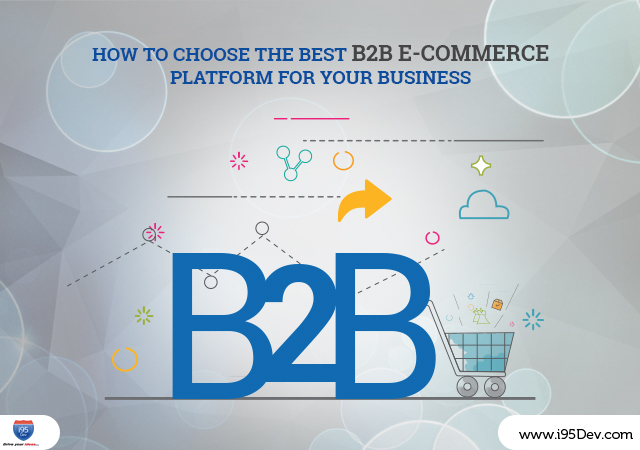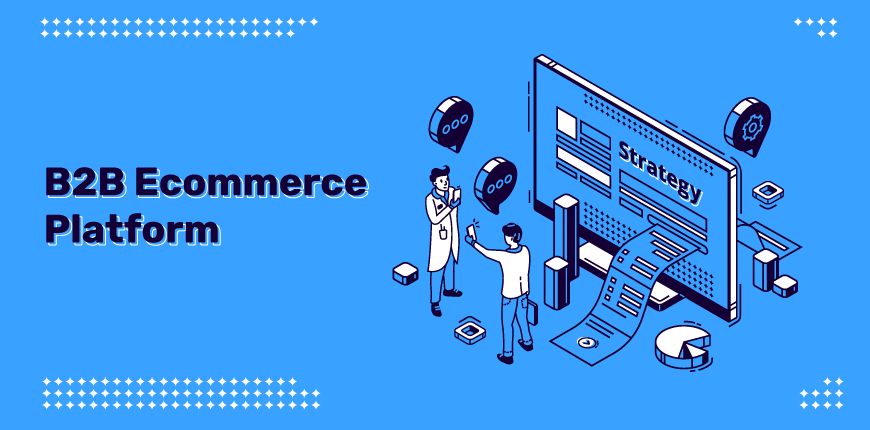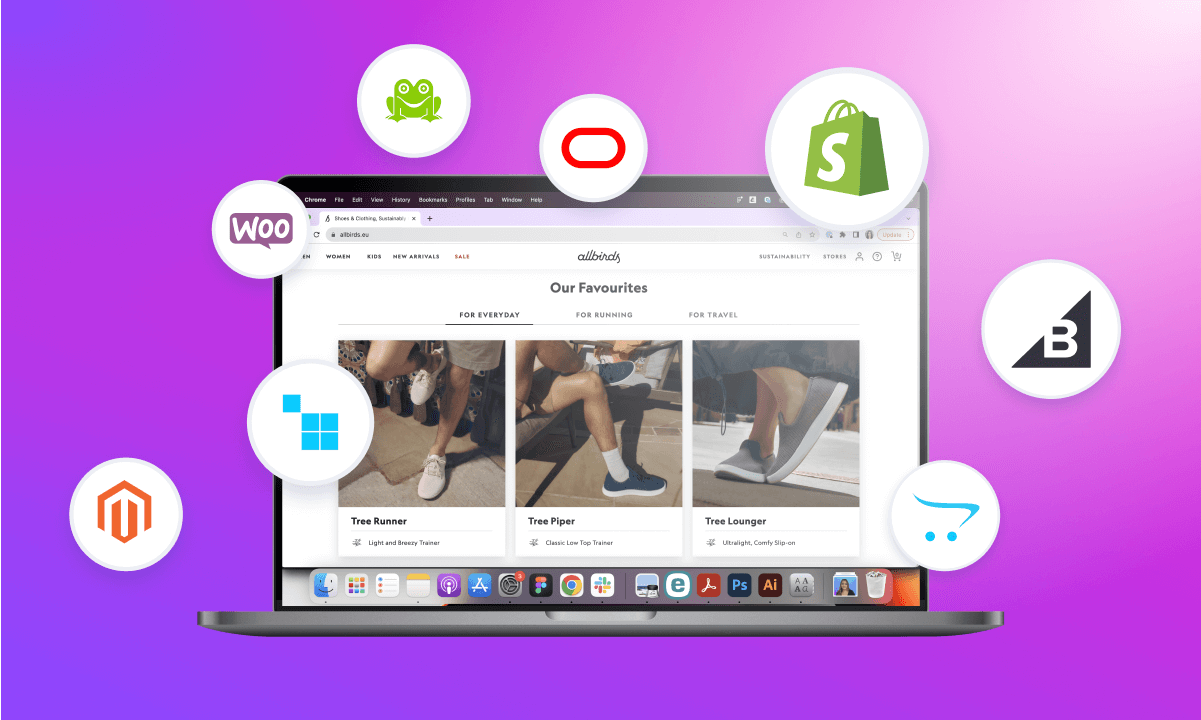Best B2B Ecommerce Platforms: Top Choices for Your Business
The best B2B eCommerce platforms include Shopify Plus, Magento, and BigCommerce. These platforms provide robust features tailored for B2B needs.
B2B eCommerce platforms are crucial for businesses seeking to streamline their operations and enhance customer experiences. Shopify Plus offers scalability and a user-friendly interface, making it ideal for growing businesses. Magento is known for its flexibility and extensive customization options, catering to complex business requirements.
BigCommerce stands out with its strong SEO capabilities and seamless integrations. Choosing the right platform can significantly impact your business’s efficiency and growth. Evaluating features like scalability, customization, and support is essential to make an informed decision. Prioritize platforms that offer comprehensive solutions to meet your specific B2B needs.
Introduction To B2B Ecommerce Platforms
In today’s digital age, B2B ecommerce platforms are essential for businesses. They streamline operations and enhance customer experiences. Understanding the basics of these platforms is crucial.
What Is B2B Ecommerce?
B2B Ecommerce stands for Business-to-Business electronic commerce. It involves online transactions between businesses. These platforms facilitate the buying and selling of products or services.
Unlike B2C (Business-to-Consumer), B2B focuses on wholesale. Transactions usually involve bulk orders. This leads to different requirements and functionalities.
B2B ecommerce platforms offer features tailored to business needs. They include bulk pricing, custom catalogs, and payment options. Such features simplify complex business transactions.
Importance For Businesses
B2B ecommerce platforms are vital for businesses today. They increase efficiency and reduce costs. Companies can automate order processing and inventory management.
These platforms also enhance customer relationships. Businesses can provide personalized experiences and better service. This leads to higher customer satisfaction and loyalty.
Additionally, B2B platforms expand market reach. Businesses can connect with global partners and customers. This opens up new opportunities for growth and expansion.
To summarize, B2B ecommerce platforms are essential tools. They drive efficiency, improve customer relations, and boost growth.

Credit: www.i95dev.com
Key Features To Look For
Choosing the right B2B ecommerce platform is critical for business success. Understanding the key features can help you make an informed decision. Here are the essential features to consider.
User-friendly Interface
A user-friendly interface is essential for B2B ecommerce platforms. It ensures that your customers can navigate easily. A simple and clean design can enhance user experience. Look for intuitive navigation menus. Ensure that the search function is efficient. A responsive design is also crucial for mobile users.
Integration Capabilities
Effective integration capabilities are vital for any ecommerce platform. Your platform should integrate with your existing systems. This includes CRM, ERP, and accounting software. Seamless integration can streamline your operations. It can also reduce errors and save time. Look for platforms offering multiple integration options.
Scalability
Scalability is crucial for growing businesses. Your B2B ecommerce platform should be able to grow with you. This means it should handle increased traffic and transactions. Look for platforms that offer scalable solutions. Ensure they provide options to upgrade features as you grow. Scalability ensures that you won’t outgrow your ecommerce platform.
| Feature | Importance |
|---|---|
| User-Friendly Interface | High |
| Integration Capabilities | Very High |
| Scalability | Critical |
Top B2B Ecommerce Platforms
Choosing the right B2B ecommerce platform is crucial. It can boost your business growth. Explore these top platforms. Each offers unique features and benefits.
Shopify Plus
Shopify Plus is a powerful B2B ecommerce solution. It handles large volumes and complex needs. It offers an easy-to-use interface. You can customize your store without coding. Here are some key features:
- Advanced customization
- Seamless integration with other tools
- 24/7 dedicated support
Shopify Plus is ideal for growing businesses. It scales effortlessly. It also provides excellent customer support. This ensures a smooth operation for your business.
Magento Commerce
Magento Commerce is a robust B2B platform. It offers extensive customization. You can tailor it to fit your business needs. Here are its main features:
- Highly customizable
- Scalable for large businesses
- Comprehensive analytics and reporting
Magento Commerce is perfect for businesses with specific requirements. It offers flexibility and control. You can manage your store with ease. The platform supports complex product catalogs and large customer bases.
Bigcommerce
BigCommerce is a feature-rich B2B ecommerce platform. It provides a user-friendly experience. You can set up your store quickly. Key features include:
- Easy setup and management
- Built-in SEO tools
- Multi-channel selling
BigCommerce is suitable for businesses of all sizes. It helps you reach more customers. The platform integrates with various sales channels. This makes it easier to grow your online presence.

Credit: bsscommerce.com
Shopify Plus Overview
Shopify Plus is a powerful B2B eCommerce platform. It helps businesses scale quickly. It offers advanced features and customizability. Large enterprises prefer Shopify Plus for their online stores.
Key Features
- Multi-Channel Integration: Sell on various platforms like Amazon, eBay, and social media.
- Customizable Checkout: Tailor the checkout experience to match your brand.
- Advanced Reporting: Access detailed analytics and reports.
- High Volume Traffic: Handle large traffic without downtime.
- 24/7 Support: Get round-the-clock support from experts.
Pros And Cons
| Pros | Cons |
|---|---|
| Easy to use | Higher cost |
| Scalable | Limited customizations |
| Strong security | Extra fees for apps |
Best For
- Large enterprises needing scalability
- Businesses with high traffic
- Brands requiring multi-channel sales
- Companies needing robust security
Magento Commerce Overview
Magento Commerce is a powerful B2B eCommerce platform. Businesses use it for flexibility and scalability. It offers extensive customization options. Many large enterprises trust it for their online stores.
Key Features
- Customizable Themes: Choose from various templates to match your brand.
- Advanced SEO Tools: Improve your search engine rankings easily.
- Robust Analytics: Track customer behavior and sales data.
- Multi-Language Support: Cater to customers globally.
- Flexible Product Catalog: Manage an extensive range of products.
- Integrated Payment Options: Provide secure payment methods.
Pros And Cons
| Pros | Cons |
|---|---|
| Highly customizable | Complex setup process |
| Scalable for large businesses | Can be costly |
| Strong community support | Requires technical expertise |
| Extensive features | May need third-party extensions |
Best For
Magento Commerce is best for large businesses. It suits enterprises that need robust customization. It’s ideal for companies with technical teams. Businesses looking to scale will benefit the most. If you need advanced features, Magento Commerce is a top choice.
Bigcommerce Overview
BigCommerce is a popular B2B ecommerce platform. It offers powerful tools for online businesses. It helps in managing products, orders, and customers. BigCommerce is known for its scalability. It supports both small and large enterprises.
Key Features
- Customizable Templates: Choose from a variety of templates.
- Multi-Channel Selling: Sell on Amazon, eBay, and social media.
- Advanced SEO Tools: Improve your site’s search engine ranking.
- Secure Payments: Accept payments securely with built-in options.
- 24/7 Support: Get help anytime from the support team.
Pros And Cons
| Pros | Cons |
|---|---|
| Easy to use | Higher pricing tiers |
| Scalable solutions | Limited free templates |
| Excellent customer support | Transaction fees on lower plans |
Best For
BigCommerce is ideal for businesses of all sizes. It suits small startups and large enterprises. It is perfect for those needing a scalable platform. It works well for companies selling on multiple channels.
Cost Considerations
Selecting the best B2B eCommerce platform involves many factors. One of the key factors is cost. Understanding cost considerations can help businesses make informed decisions. This section focuses on three main aspects: Subscription Fees, Additional Costs, and Value for Money.
Subscription Fees
Subscription fees are a significant part of the total cost. Most platforms offer different pricing tiers. These tiers often depend on features and user numbers. Some platforms charge a fixed monthly fee. Others may have a variable pricing model based on usage.
| Platform | Basic Plan | Premium Plan |
|---|---|---|
| Platform A | $29/month | $299/month |
| Platform B | $49/month | $499/month |
| Platform C | $79/month | $799/month |
Additional Costs
Additional costs can add up quickly. These may include transaction fees, payment gateway fees, or integration costs. Some platforms charge for add-ons or customizations. Businesses should consider these extra costs.
- Transaction Fees: 2%-3% per transaction
- Payment Gateway Fees: $0.30 per transaction
- Integration Costs: $100-$500 per integration
Value For Money
Determining the value for money involves comparing costs and benefits. A higher subscription fee may offer more features and better support. Businesses should assess whether the features justify the cost. Look at customer reviews and expert opinions to gauge value.
Consider the long-term benefits and potential ROI. A more expensive platform may offer better scalability. This can be crucial for growing businesses.

Credit: www.edesk.com
Choosing The Right Platform
Choosing the right B2B ecommerce platform is crucial for your business. The right platform can make operations smooth and boost sales. It is important to consider various factors before making a decision.
Business Size And Needs
The size of your business plays a big role in your choice. Small businesses may need fewer features. Large enterprises often require more complex functionalities. Assess your business needs carefully.
| Business Size | Recommended Platform Features |
|---|---|
| Small Business |
|
| Large Enterprises |
|
Future Growth
Think about your future growth while choosing a platform. A scalable platform is essential for expanding businesses. Ensure the platform can handle increased traffic and orders. Check for features that support international sales and multi-currency transactions.
Customer Support
Strong customer support is vital for any ecommerce platform. Evaluate the support options available. Look for platforms offering 24/7 support. Good support can help resolve issues quickly and keep your business running smoothly.
Consider the following support features:
- Live Chat
- Email Support
- Phone Support
- Comprehensive Knowledge Base
Reliable customer support ensures minimal downtime and helps you grow your business efficiently.
Frequently Asked Questions
What Are B2B Ecommerce Platforms?
B2B ecommerce platforms are online solutions that facilitate transactions between businesses. They offer tools for managing orders, inventory, and customer relationships. These platforms streamline operations and improve efficiency.
Why Choose A B2B Ecommerce Platform?
Choosing a B2B ecommerce platform enhances operational efficiency. It simplifies order management and improves customer service. These platforms also offer scalability and integration with other business tools.
Which Features Are Crucial In B2B Platforms?
Crucial features include robust inventory management, secure payment gateways, and seamless integration with ERP systems. They should also offer customization options and analytics tools.
How Do B2B Platforms Differ From B2C?
B2B platforms focus on bulk transactions and long-term relationships. They offer complex pricing structures and custom catalogs. B2C platforms cater to individual consumers with simpler pricing and broader product ranges.
Conclusion
Choosing the right B2B ecommerce platform can transform your business operations. Evaluate features, pricing, and scalability to find the best fit. Ensure the platform meets your unique business needs. Investing time in research will lead to better customer experiences and increased growth.
Make a well-informed decision for long-term success.






